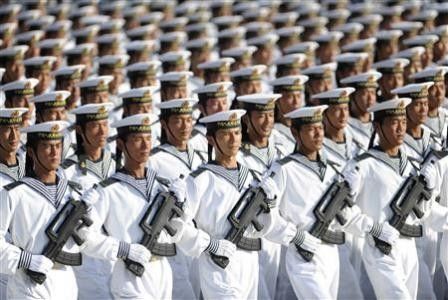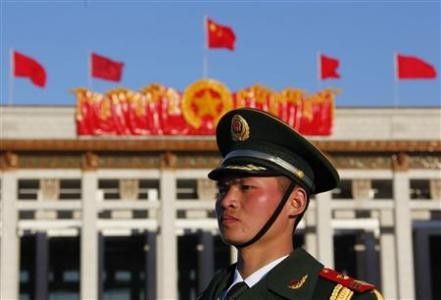China defense budget to stir regional disquiet
China will beef up its military budget by 12.7 percent this year, the government said on Friday, a return to double-digit spending increases that will stir regional unease.
The country's growing military clout has coincided with a more assertive diplomatic tone, evident in spats last year with Japan and Southeast Asia over disputed islands, and in rows with Washington over trade, the yuan currency and human rights.
Chinese parliamentary spokesman Li Zhaoxing said the defense budget would be 601.1 billion yuan ($91.5 billion) in 2011, from 532.1 billion yuan last year. The budget went up by just 7.5 percent in 2010, after a long period of double-digit hikes.
Many experts believe China's actual spending on the 2.3 million-strong People's Liberation Army (PLA) is far higher than what the government reports.
It's widely accepted that these figures bear only a marginal relationship with the actual overall spending. Overall, it means the Chinese are saying we are going to (boost) our defense budget, whatever the real numbers are, said Dean Cheng, a China security expert at the Heritage Foundation in Washington.
China, now the world's second-largest economy, often points out that its defense spending pales in comparison with the United States and that its military upgrades are for defensive purposes.
The Pentagon last month rolled out a record base budget for fiscal year 2012 of $553 billion, up $22 billion from the level enacted for 2010.
But China has made some eye-catching moves in recent months, none more so than conducting its first test flight of a stealth fighter jet when U.S. Defense Secretary Robert Gates was visiting Beijing in January.
China could also launch its first aircraft carrier this year, according to Chinese military and political sources, a year earlier than U.S. military analysts had expected.
The PLA is an important and powerful force in decision-making and there is obviously a desire to signal to the Chinese public and Chinese nationalists that China is going to continue to get stronger, said Rory Medcalf of Australian think tank the Lowy Institute.
That signal may prompt greater wariness from neighbors.
Japan said on Thursday it scrambled military jets this week after Chinese naval planes flew near disputed islands in the East China Sea, although the Chinese did not enter Japan's airspace.
The Philippines also demanded an explanation from China over an incident on Wednesday in a disputed area in the South China Sea, where it says two Chinese patrol boats threatened to ram a survey ship.
MILITARY BUILD-UP
Indeed, other nations are upgrading their forces in response to China's build-up.
India increased annual defense spending by about 11.6 percent this week and is shopping for advanced fighter jets, transport aircraft, surveillance helicopters and submarines.
Some officials in Taiwan are especially alarmed. China has around 1,400 missiles aimed at the island, according to the Taipei government. China has vowed to bring the democratically ruled island under mainland rule, by force if necessary.
China's military power is now growing quickly, said Lin Yu-Fang, a member of the Taiwan parliament's defense committee in response to the Chinese budget number. The United States should help us turn the situation around, and we hope European countries will also sell us advanced weapons.
Chinese parliament spokesman Li said the military spending rise was justified. China posed no threat to anyone, he added.
China's defense spending is relatively low by world standards, he said. China has always paid attention to restraining defense spending.
Andy Gilholm, senior China analyst for risk consultancy Control Risks, said China was not trying to rival U.S. global power projection but wanted to make it harder for Washington to impose its might in what China considers its own backyard.
The key issue for the U.S. and its regional allies is not the gap in spending or overall capabilities, but the extent to which China could potentially threaten or constrain U.S. ability to use its military dominance to help support its goals in the region, Gilholm said.
China's loud, renewed claims to a vast swathe of waters and mostly uninhabited islets in the South China Sea, along with the expansion of its military presence there, rattled Southeast Asian nations in 2010.
Relations between China and Japan also chilled last year when Japan detained the Chinese skipper of a boat that crashed into its ships near disputed isles in the East China Sea, the site of vast potential gas and oil reserves.
Still, a retired Chinese military officer, Xu Guangyu, said the spending rise was needed to cope with inflation, which was eating into paychecks and equipment outlays.
In the next two years the wages of some military personnel will have to rise relatively quickly, because inflation is quite high, said Xu.
Military equipment, uniforms and logistics are all feeling the pressure of price rises.




© Copyright Thomson Reuters {{Year}}. All rights reserved.





















